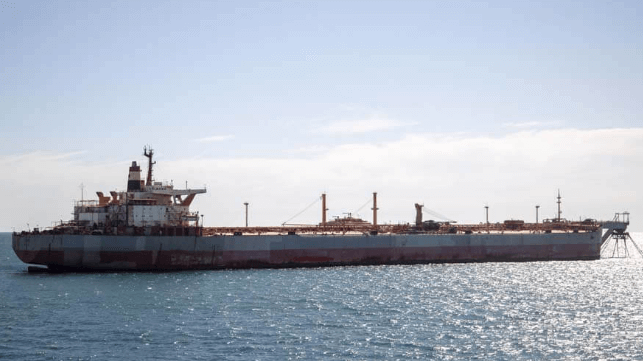By AFP
Published May 30, 2023

Crew from the support vessel Ndeavor spy the abandoned oil tanker FSO Safer near the coast of Yemen in a handout photo from Dutch company Boskalis
The United Nations said Tuesday it is ready to start salvage work on an oil tanker stranded off Yemen’s coast with more than one million barrels of crude that pose an acute risk to the environment.
“We’re very happy to be on site where we can start the work,” David Gressly, the UN coordinator for Yemen, said by videoconference from aboard a support vessel that has arrived at the stricken ship, the FSO Safer.
In an unprecedented salvage plan, the UN has purchased a super-tanker to remove the oil from the vessel in the Red Sea. The actual pumping will start in about 10 days to two weeks, said Gressly.
The 47-year-old Safer has not been serviced since Yemen’s civil war broke out in 2015 and it was left abandoned off the rebel-held port of Hodeida, a critical gateway for shipments into a country heavily dependent on foreign aid.
Experts say the ship is at risk of breaking apart, exploding or catching fire.
The Safer’s 1.1 million barrels are four times as much oil as that which spilled in the 1989 Exxon Valdez disaster off Alaska, one of the world’s worst ecological catastrophes, according to the UN.
The salvage operation, which will cost an estimated more than $140 million, has been assigned to a company called SMIT Salvage. It will pump the oil from the Safer to the now UN-owned ship called Nautica, and then tow away the empty tanker.
That’s much cheaper than the costs estimated to take care of a potentially catastrophic oil spill, which would take $20 billion to clean up.
But the UN says it is still $29 million dollars short on the sprawling project.
A SMIT support vessel called the Ndeavor arrived Tuesday at the site loaded with equipment. It will begin preparatory work on Wednesday.
“With the arrival of the Ndeavor next to the FSO in the Red Sea, we truly have reached a critical milestone,” said Achim Steiner, head of the UN Development Programme, which is in charge of the salvage operation.
“If all goes according to plan, somewhere in late June, early July, we might be in a position to say that that critical phase of the ship-to-ship transfer could be completed,” Steiner said.
Video: UN-Backed Salvage Team Arrives at FSO Safer off Yemen

The team for the UN-backed salvage effort of the decaying offshore oil storage tanker FSO Safer (406,000 dwt) arrived in Yemen today, May 30, to begin the operation that plans to transfer the more than one million barrels of crude oil from the decaying tanker. Boskalis and the team from SMIT reported that they departed Djibouti along with UN representatives on May 29 to begin an operation that has been estimated will take more than seven weeks.
“After two years of political groundwork, fundraising, and UNDP project development, the operation on the water is set to begin!,” David Gressly, United Nations Resident and Humanitarian Coordinator in Yemen Tweeted today. After years of working to reach the agreements necessary for the operation, Gressly was aboard the Boskalis vessel Ndeavor as it arrived at the FSO Safer.
The UN has been leading the difficult negotiations originally proposing to survey the vessel and oversee repairs to the rebels which control that region of Yemen. The earlier agreements to oversee the maintenance and repairs of the vessel which was built in 1976 failed and the UN later reported that it had been determined that the FSO Safer was beyond repair and at imminent risk of leaking, sinking, or possibly exploding because its tanks have not been properly vented in years. Only a skeleton crew with limited resources has been aboard the tanker moored about 4.8 nautical miles off the coast of Yemen.
The Ndeavor had recently been in Djibouti after passing through the Suez Canal. Joining in the international contributions, Egypt gave the vessel free passage in support of the effort. While in Djibouti, final supplies and a team of approximately 40 salvage experts and support staff boarded the vessel.
The plan calls for the team to immediately begin a visual inspection of the FSO Safer while also taking measurements regarding the level of toxic gas. The ventilation system has reportedly not been operational since 2017. The salvage team will inspect the pumps and engine room, the status of the mooring arrangement, and assess the condition of the estimated 1.4 million barrels of light crude as well as the cargo lines, inert gas lines, valves, and manifolds.
The team is also carrying a portable inert gas generator which they plan to use to begin to stabilize the tanks on the FSO Safer. They expect it will take two weeks during this first phase of the operation and only then will the tanker purchased from Euronav arrive in Yemen. The Nautica (307,000 dwt) is currently waiting in Djibouti.
UN supplied video shows the condition of the vessel as the team arrived today in Yemen
The actual transfer of the oil is expected to take 19 days between the two ships. During the final phase, which will require an additional 17 days, the salvage team will use a mobile spray tank cleaning machine. The residuals and dirty water will also be transferred to the Nautica.
Under the UN plan, the FSO Safer will be sold for green recycling. The UN is continuing the fundraising efforts to pay for the operation, noting that the oil belongs to rebels and can not be used to pay the costs of the transfer.
No comments:
Post a Comment